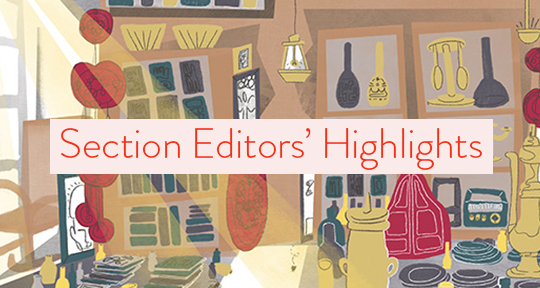Our editors bring you the latest news in global literature from Italy and Japan this week as COVID-19 continues to make its presence known, the one-hundredth anniversary of Gianni Rodari’s birth is celebrated, and traditionally paper-dependant Japan starts investing in a virtual literary presence. Read on for the scoop!
Anna Aresi, Copy Editor, reporting from Italy:
As is well known to people in the industry, the COVID-19 pandemic has deeply impacted the publishing sector on many levels. In particular, the cancellation of most book fairs has deprived many of an important opportunity to meet fellow publishers, authors, translators and illustrators, to discover new releases to potentially translate, and set up those professional relationships that keep the industry alive. However, as we’ve seen over and over again in these months, the scope of the pandemic’s impact has often been countered with inventive, creative solutions to hold these same events in a different format.
One of the book fairs that had to be canceled was the Bologna Children’s Book Fair, one the most important events for children’s literature, taking place in Bologna, Italy, every spring. Originally scheduled to be postponed, it soon became clear that holding the BCBF in praesentia was not going to be possible, and the event happened virtually this past May.
One of the highlights of this year’s edition was the celebration of the one-hundredth anniversary of Gianni Rodari’s birth. Rodari is perhaps the single most important author of children’s books in Italy, having influenced and shaped generations of students, teachers, authors, and illustrators with his poems, short stories, books, and theoretical essays. The BCBF’s website hosts a virtual exhibition, Illustrators for Gianni Rodari, showcasing the works of many Italian artists who’ve illustrated Rodari’s books. In particular, Beatrice Alemagna, an award-winning Italian illustrator based in Paris, participates with her new illustrations for A sbagliare le storie (Telling Stories Wrong), in which an absent-minded grandfather keeps making mistakes when trying to tell the story of Red Riding Hood to her granddaughter, who has to continually correct him. As anyone who’s ever read to young children knows, consistency is key when telling them stories (over and over and . . . over again!), yet as the book shows, deviations from the norm might be as fun and rewarding as the canonical version. Alemagna’s beautiful new visual interpretation of this classic will hopefully be brought to other languages soon! READ MORE…





